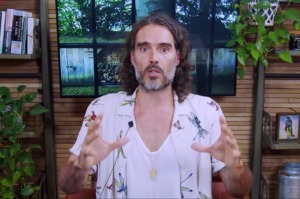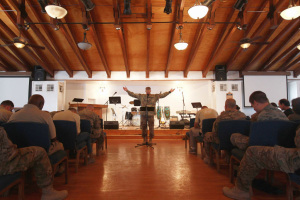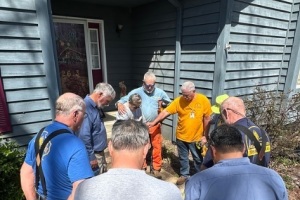King's College Professor Retells Road to Emmaus Story Through Modern-Day Lens
NEW YORK – The Road to Emmaus story is a historical account of a conversation between two disciples as they grapple with despair and disillusionment following the crucifixion of Jesus. They meet a stranger who is actually Jesus, but it is only when their eyes are opened that they see him for who he is: the resurrected Messiah. The biblical drama is retold through modern-day lens by historian Joseph Loconte in The Searchers: A Quest for Faith in the Valley of Doubt, which releases this week.
Loconte, associate professor of history at The King's College, spoke about his new book at a Socrates in the City meeting Thursday at Central Presbyterian Church in the Upper East Side. He was invited by host Eric Metaxas, who founded Socrates in the City as forum to examine the "big questions of life." Metaxas is known for his bestselling biography Bonhoeffer: Pastor, Martyr, Prophet, Spy.
During his lecture, Loconte examined the force that seized the travelers in Luke's account of the Road to Emmaus. The disciples were shocked and in utter disillusionment that their leader, the one they thought would redeem Israel, had been crucified. They had lost all hope, yet something calls them out of their state of doubt and to the stranger coming alongside them on the road. They did not recognize him as Jesus – yet – but their intuition drew them to him.
"Were not our hearts burning within us while he talked with us on the road and opened the Scripture to us?" they asked each other.
Something provoked them. What was it?
What attracted them to Jesus, according to Loconte, was the desire for "moral beauty." As Jesus spoke, their hearts were ignited by God's story of healing, courage and rescue. Amid their despair, they get a vision of a world they were meant to live in.
Loconte said C.S. Lewis detected a universal longing to bridge the divide between this world and the other world. He described the perpetual longing as our "inconsolable secret."
In The Searchers, Loconte recounted some of the stories that exemplified virtue and "moral beauty" in our time. In the 1800s, Florence Nightingale was known as the Lady with the Lamp for tending to wounded soldiers during the night. During the Civil War, Colonel Joshua Lawrence Chamberlain believed in the cause of abolition so much that he told his men to hold their ground even when they ran out of ammunition. In the final years of the Second World War, villagers in LeChambon-sur-Lignon opened their homes to rescue 3,500 Jews, all of whom survived the war.
At Thursday's Socrates in the City, Loconte told the audience that all of us – sooner or later – will enter into a valley of doubt and disillusionment that launches our personal quest for answers, meaning and ultimately God.
Just like the disciples on the way to Emmaus, Loconte pointed out, we start our journey with doubt but then get drawn to stories of healing, courage, and rescue. The disciples were at first captivated by Jesus' description of the Kingdom of Heaven and the story of God's rescue mission for the human race. But eventually, they were drawn to Jesus, himself, recognizing him as the Messiah.
Loconte said that travelers on this road are asked to make a choice. The "burning" that the disciples experienced as they listened to a stranger led them to Jesus but did not solve the problem of their "inconsolable secret." It was only when they accepted Jesus as the Messiah and submitted themselves to this truth that their search was complete.
"It is not enough to know the truth about God's love," said Loconte. "The travelers on the Road to Emmaus are asked to submit themselves, to fulfill their own part in this great story of rescue and redemption."
To further illustrate the importance of our decision, Loconte quoted French mathematician Blaise Pascal:
"There are two kinds of people one can call reasonable; those who serve God with all their heart because they know Him, and those who seek Him with all their heart because they do not know Him."
During the Q & A, Metaxas questioned Loconte on a chapter of his book, "The Poison of Religion," which gives a hardline critique of counterfeit religion. Metaxas also spoke about phony religiosity in his National Prayer Breakfast speech in February. The speech was recently released in an e-book titled Jesus Hates Dead Religion.
Why was Loconte's criticism of organized religion different from that of New Atheist authors such as Richard Dawkins and Christopher Hitchens? posed Metaxas.
Loconte answered that that there is a difference between skepticism and cynicism. These authors are not probing Christianity because of skepticism but out of their overwhelming cynicism, which has hindered their ability to see the good, useful, positive and life-giving aspects of Christianity.
He added that even skepticism, at best, is intellectual confusion and dishonesty. Jesus has always recognized the inclination of evil to abuse the faith.
"Those guys failed to recognize that within the Christian story itself, within the life of Jesus, no one is tougher on the poison of religion, on hypocrisy than Jesus. He calls the religious people of his day 'white-washed tombs,' 'unmarked graves' and 'children of the devil,'" said Loconte.
Loconte's new book The Searchers: A Quest for Faith in the Valley of Doubt releases June 5 from Thomas Nelson.
The conversation on militant atheism is expected to continue at the upcoming Socrates in the City event on June 12. Dr. David Berlinski, a senior fellow in the Discovery Institute's Center for Science and Culture, will sit down with Eric Metaxas and speak on his book The Devil's Delusion: Atheism and Its Scientific Pretensions.





























